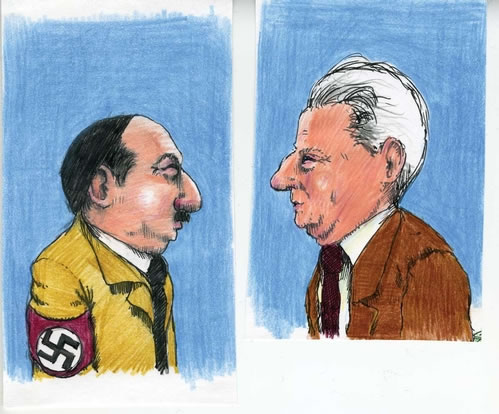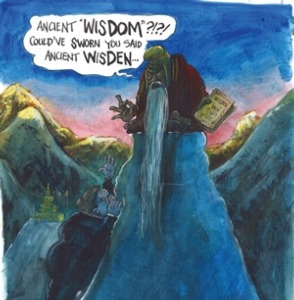Emmanuel Levinas spoke scathingly of the “stupidity” and “pathos” of any endeavour to relate his life meaningfully in a linear narrative. In his book Difficult Liberty, he briskly recounts a rough sequence of events that coloured his personal and intellectual development: reading Pushkin, Tolstoy, and the Hebrew Bible during his childhood in Lithuania; the Bolshevik Revolution; philosophical studies in Freiburg; captivity during the Second World War; distinguished professorships at Poitiers, the Sorbonne, and so on. Nevertheless, these loose threads were bound together by a single cataclysmic theme: “This disparate inventory,” he concluded, “…is dominated by the presentiment and the memory of the Nazi horror.”
 Nor was his most abstract philosophical thought unaffected. As circumstance would have it, the most profound intellectual influence of his life, the German thinker Martin Heidegger (1889-1976), would also happen to be a Nazi who saw himself as no less than the official philosopher of the Third Reich, at whose hands Levinas would remain imprisoned for five years while the systematic murder of his people was carried out across Europe.
Nor was his most abstract philosophical thought unaffected. As circumstance would have it, the most profound intellectual influence of his life, the German thinker Martin Heidegger (1889-1976), would also happen to be a Nazi who saw himself as no less than the official philosopher of the Third Reich, at whose hands Levinas would remain imprisoned for five years while the systematic murder of his people was carried out across Europe.
Despite his outward scepticism regarding biography, then, Levinas’s writings tell the extraordinary story of his quest to think his way free of Heidegger, and to bring human ethics back to the forefront of philosophy.
Born in 1906 of Jewish parents in Kaunas, Lithuania, an inspired and brilliant 23-year-old Levinas arrived in Freiburg in 1928 to study under the father of phenomenology, Edmund Husserl (1859-1938). It turned out to be rather late in the day – a 69-year-old Husserl was preparing to retire, and a radically original intellectual phenomenon was rising to eclipse him. “I came to see Husserl,” wrote Levinas, “and what I saw was Heidegger.”
The previous year, Heidegger had published what arguably remains the seminal philosophical work of the 20th century – Being and Time. This monumental tome sought to uproot the very foundations of the entire 2,500-year tradition of western philosophy from Plato to Nietzsche by performing a radical shift from metaphysics – the rational enquiry into the nature of things – to ontology – the philosophy of Being.
For Heidegger, the metaphysical quest for absolute knowledge of what lies beyond perceived surfaces reached its culmination with Hegel (1770-1831), and its “last gasp” with Nietzsche (1844-1900). Plato, and the entire philosophical tradition descending from him, had “sent Being away”, positing it as always existing elsewhere – for example, in the unknowable realm of the Forms, or in the Kantian “noumenal world”. In doing so, philosophy had neglected the “primordial” kind of Being, that largely concealed essence of our consciousness that is further revealed to us through thought, art, poetry and communion with nature. Heidegger offers us an example of how this “authentic” Being can occur to us in Being and Time: a workman is making a barrel, hammering away unthinkingly in his day-to-day “context of significance”. The hammer is initially no more than what the worker hammers with; however, the hammer suddenly breaks in his hand, and looking at the broken pieces, the barrel-maker is brought sharply out of his “everydayness”; what Heidegger calls its “intentional” quality is suddenly contrasted with the broken pieces. Just so, when you snap a plastic fork while eating, something strange happens – its previous “forkness” is thrown into relief, bringing to consciousness the odd fact that you were using it at all, and illuminating the “ontological difference” between beings and Being – between mere things and the uncanny fact that they are. The effect on Levinas’s thought was dramatic; everything would now have to be considered in the ontological light cast by Being and Time.
Heidegger had been involved with the Nazi party in Germany as early as the late twenties, but it was in 1933 that he made his first open proclamation of his support – both political and philosophical – for Hitler’s regime. Upon accepting the Rectorship of Freiburg University, he stated in a notorious inauguration address that “The Führer himself, and he alone, is the German reality, present and future, and its law.” The Third Reich, Heidegger believed, heralded a new epoch, in which lowly humanism, a sentimental construct, would be overwhelmed by the call to a greater destiny – a destiny suffused with the poetic atmosphere of primordial Being.
Of the myriad victims of the systematic onslaught upon European Jewry, Levinas himself was among the most fortunate. Sent to the front as a sergeant in June 1940, he was one of hundreds of thousands of French soldiers who were swept up by the Nazi advance and sent to concentration camps across Europe. He was deported to Stalag XIB at Fallingbostel, near Hanover, where he was stamped Prisoner 1492 (the year of the Spanish expulsion of Jews, which bore a poignant resonance for him). Sentenced to hard labour in the forest, Levinas made the best of a dire lot, and managed to read Hegel, Rousseau and Proust, among others, as well as beginning to formulate in his notebooks the ideas that would instigate his departure from Heidegger.
Since 1933, he had been appalled by Heidegger’s actions, but insisted nevertheless that he was a “genius”, and “the greatest philosopher of the century”. Indeed, Heidegger’s influence remains immeasurable today, and the very greatest thinkers of the 20th century are indebted to him – not least Jacques Lacan, Jean-Paul Sartre and Jacques Derrida, whose deconstructive work is considered by some to be no more than a series of footnotes to Heidegger’s original conception of the destruction of metaphysics, difference and the “breaking” of language. Such an undeniable philosophical presence, then, demanded not condemnation and dismissal but a comprehensive philosophical – and ethical – response.
In his 1961 masterpiece Totality and Infinity, Levinas argued that beyond ontology – the basics of existence – is an irreducible ethical sense that arises in us when we come “face to face” with “the Other”. It is experiential, and therefore transcends theorising – it just happens. This Other is always another person, and is always, Levinas says, “absolutely other”, always absolutely inscrutable. We can never objectify, theorise, or reduce the Other to a likeness of one’s self, or to an ontological category. We may meditate insularly on Being, but the Other always comes to us unexpectedly, and calls us out of ourselves and into an ethical confrontation. The unbridgeable gap between us gives rise to a “metaphysical desire” for discourse and reciprocity, which can never be completely fulfilled, but remains all the more powerful for that reason. We may choose to shun the call of the Other or to subject him to our will, but not even by murdering him can we dissolve the infinite gulf between us, and objectify him, as the Nazis attempted to do to European Jewry. And no matter how we may treat the Other, he is always justified in his existence, and speaks to an innate need in us to justify our own existence in his presence, for he is always higher than one’s self, is never subsumed by Being, and always remains outside any totalising mode of thought (such as Nazism). In this sense, the Other is “infinite”.
This inscrutability, and the sense of “infinity” that arises from it, is the fundamental experience from which all thought derives, and is the generator of our ethical feelings. Indeed, Levinas, in arguing that thought arises from ethics, and not vice versa, turned philosophy on its head, and as such is the humanist philosopher par excellence. He brought philosophy back from the realm of the lone thinker meditating dangerously on Being, to the experience of our fellow human being. Totality and Infinity, then, can be seen as a veritable humanist manifesto. Though not without its problems (many criticise, for example, the opacity of Levinas’s language when it comes to explaining just how it is that we know that this primordial experience is genuine or reliable), Levinas’s thought comprises the most comprehensive attempt yet to bring philosophy to bear upon the world of human relations. As such, it is ever more relevant to the current geopolitical morass, which, without a drastic reevaluation of our relation to our fellow human beings, is doomed to enact a repetition of the same old round of nationalism, theocratic fascism and ideological dogma.

